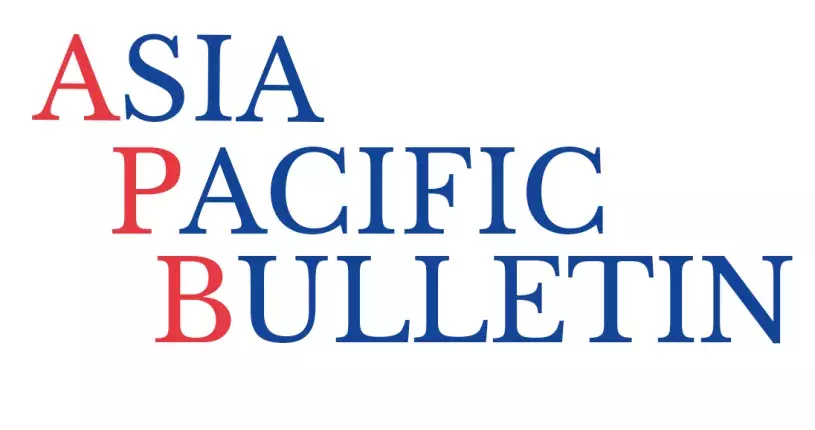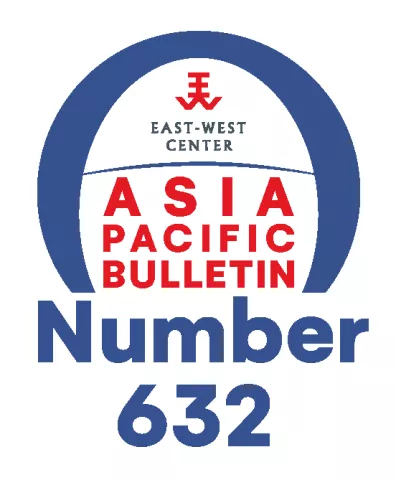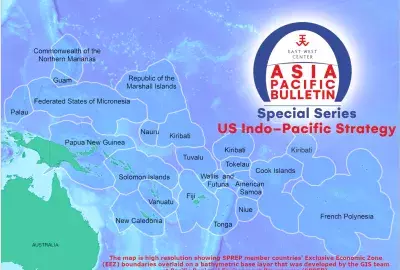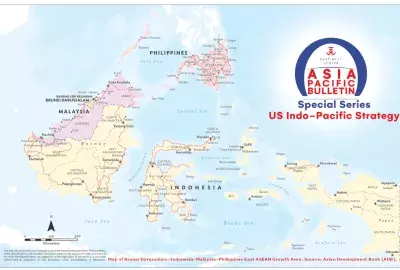Error message


| Dr. Tereza Novotna, Korea-Europe Center Fellow at the Free University Berlin, Korea Associate at 9DashLine, and Senior Associate Fellow at EUROPEUM Prague, reflects on "two lessons and three opportunities that the War in Ukraine presents to Kim Jong Un and concludes with recommendations on what the Europeans could do in the near future." |
| for additional titles in the Asia Pacific Bulletin |
| This article is a part of the North Korea in the World Special Series, a joint project between the National Committee on North Korea and the East-West Center that examines North Korea's external relations. |
A year ago, in February 2022, Russia invaded its neighbor, Ukraine. Russian aggression has upended the post-war security mechanisms in Europe and made the international multilateral system, including the UN Security Council, more fragile and ineffective than ever.
Even though the war in Ukraine has implications for security in Northeast Asia, many Asian nations consider it a distant issue for Europeans to solve. However, this perspective mirrors what Europe’s Asian counterparts, especially the Koreans, have faced for decades. It serves as an apt analogy for explaining the dangers of North Korea to Europe.
North Korea is also watching the war closely to discern what lessons or leverage can be extracted from the unfolding conflict. This short article reflects on two lessons and three opportunities that the War in Ukraine presents to Kim Jong Un and concludes with recommendations on what the Europeans could do in the near future.
The first, and most profound, lesson North Korea’s leader likely learned from the conflict is rather obvious: his bet on nuclear weapons is correct, as these weapons are, perhaps, the only means of keeping his regime in power. If the examples of Iraq and Libya made Pyongyang hesitant to surrender its nuclear arsenal, Russia’s invasion of Ukraine makes it abundantly clear that relinquishing nuclear weaponry in exchange for security guarantees is a perilous venture.
To incentivize the nuclear disarmament of Ukraine, Belarus, and Kazakhstan, Russia and the United States agreed to respect sovereignty and independence of these three nations in the 1994 Budapest Memorandum. In the end, it was not the United States, Pyongyang’s archenemy, but Russia, a stalwart friend of the Democratic People’s Republic of North Korea (DPRK), that blatantly violated the agreement by invading Ukraine. Ukraine’s example showcases how denuclearization leaves the DPRK vulnerable to attacks from friendly and adversarial nations alike. Therefore, North Korea will not give up its nuclear and ballistic weapons anytime soon. The international community must come to terms with this reality as quickly as possible–as others have also recently argued.
Pyongyang’s second lesson relates to how Russia mobilized its forces in preparation for its assault on Ukraine. Despite its “peace” rhetoric in early 2022, Russia used military exercises to obfuscate its malicious intentions. North Korea has always been allergic to US-South Korean military drills and called them, rightly or wrongly, provocations. Pyongyang now has a tangible example of how military exercises can act as the vanguard for a full-blown armed offensive. Moreover, it’s not only in Europe where drills can lead to an incursion. Kim Jong Un observed how Chinese President Xi exploited Nancy Pelosi’s controversial Taipei trip in the summer of 2022 to rehearse an attack on Taiwan.
The obligatory response to these “war games” is that they divert resources from other parts of North Korea’s economy, like agriculture, where they are desperately needed. But now, more than ever, the DPRK has reasons to perceive these exercises as imminent threats. To avoid miscalculations by either side, the United States and South Korea should therefore dial down the tensions and avoid tit-for-tat actions.
There are however also three windfalls that the DPRK stands to gain from Russia’s war with Ukraine. Firstly, in the diplomatic arena, the incapacitation of the United Nations Security Council (UNSC) and a renewed friendship with Moscow provide Pyongyang with a great window of opportunity. North Korea used to be the most sanctioned country in the world, but it has lost this privilege to Russia. While the UNSC is deadlocked, there will be no new UN sanctions. Moreover, G7+ restrictive measures will not act as a sufficient substitute if neither Beijing nor Moscow is willing to implement them.
Secondly, North Korea’s budding friendship with Russia allows Pyongyang to diversify its interests away from China. Although the relationship between Kim and Xi has become more cordial over time, Pyongyang has never enjoyed its dependence on Beijing. Deeper cooperation with Moscow, therefore, provides a good opening for managing North Korea’s overreliance on its Chinese neighbor, both financially and politically. Kim may also think that Putin is more likely to support him militarily should an armed conflict suddenly flare up on the Korean peninsula.
Thirdly, Russia’s war effort also provides Pyongyang with good business opportunities. Moscow is willing to violate UN sanctions on overseas labor in order to employ North Korean workers. Additionally, Russia actually wants to purchase goods from Pyongyang. It is not readily apparent why the Russia-linked Wagner Group would be buying old-fashioned guns made in North Korea, as the US intelligence community claims, when better quality firearms are available on other black markets.
Nonetheless, if US intelligence is correct, while Pyongyang is supplying Russia with shells, Seoul is selling tanks and howitzers to Poland and the United States is transferring munition stockpiles from South Korea to Ukraine. Russian propaganda often characterizes the invasion of Ukraine as a “proxy war” between NATO and Moscow. Instead, there is a Vietnam war-like paradox, in which arms and munitions provided to each side by their chosen Korean ally clash on the frontlines of this conflict.
So, what should the Western world, especially the Europeans, do in response to such a conundrum? First and foremost, we need to recognize, formally or informally, that North Korea will not denuclearize and look for ways to limit, rather than abolish, its nuclear arsenal. Furthermore, we should stop lumping Pyongyang, Moscow, and Beijing into one basket. Creating an Axis of Evil 2.0 will only become a self-fulfilling prophecy. Instead, we should endeavor to lure North Korea away from both the Russian and Chinese spheres of influence. After all, diversification and decoupling from Moscow and Beijing are what the “West” has been struggling to do since the war in Ukraine broke out. If this is our goal, it may as well be Pyongyang’s.
The best place for us to start is to work on creating conditions for re-engagement and dialogue with North Korea. The most opportune moment may arrive when the DRPK begins opening its post-pandemic borders to foreigners. Instead of competing with one another who rushes in first, the Europeans should contemplate how to go back united under the EU flag and what incentives to provide to Pyongyang so that it abandons both Moscow and Beijing. The DPRK has always been good at playing big powers against one another. The best strategy for us is to learn how to do so vis-à-vis North Korea.

| Dr. Tereza Novotna, Korea-Europe Center Fellow at the Free University Berlin, Korea Associate at 9DashLine, and Senior Associate Fellow at EUROPEUM Prague, reflects on "two lessons and three opportunities that the War in Ukraine presents to Kim Jong Un and concludes with recommendations on what the Europeans could do in the near future." |
| for additional titles in the Asia Pacific Bulletin |
| This article is a part of the North Korea in the World Special Series, a joint project between the National Committee on North Korea and the East-West Center that examines North Korea's external relations. |
A year ago, in February 2022, Russia invaded its neighbor, Ukraine. Russian aggression has upended the post-war security mechanisms in Europe and made the international multilateral system, including the UN Security Council, more fragile and ineffective than ever.
Even though the war in Ukraine has implications for security in Northeast Asia, many Asian nations consider it a distant issue for Europeans to solve. However, this perspective mirrors what Europe’s Asian counterparts, especially the Koreans, have faced for decades. It serves as an apt analogy for explaining the dangers of North Korea to Europe.
North Korea is also watching the war closely to discern what lessons or leverage can be extracted from the unfolding conflict. This short article reflects on two lessons and three opportunities that the War in Ukraine presents to Kim Jong Un and concludes with recommendations on what the Europeans could do in the near future.
The first, and most profound, lesson North Korea’s leader likely learned from the conflict is rather obvious: his bet on nuclear weapons is correct, as these weapons are, perhaps, the only means of keeping his regime in power. If the examples of Iraq and Libya made Pyongyang hesitant to surrender its nuclear arsenal, Russia’s invasion of Ukraine makes it abundantly clear that relinquishing nuclear weaponry in exchange for security guarantees is a perilous venture.
To incentivize the nuclear disarmament of Ukraine, Belarus, and Kazakhstan, Russia and the United States agreed to respect sovereignty and independence of these three nations in the 1994 Budapest Memorandum. In the end, it was not the United States, Pyongyang’s archenemy, but Russia, a stalwart friend of the Democratic People’s Republic of North Korea (DPRK), that blatantly violated the agreement by invading Ukraine. Ukraine’s example showcases how denuclearization leaves the DPRK vulnerable to attacks from friendly and adversarial nations alike. Therefore, North Korea will not give up its nuclear and ballistic weapons anytime soon. The international community must come to terms with this reality as quickly as possible–as others have also recently argued.
Pyongyang’s second lesson relates to how Russia mobilized its forces in preparation for its assault on Ukraine. Despite its “peace” rhetoric in early 2022, Russia used military exercises to obfuscate its malicious intentions. North Korea has always been allergic to US-South Korean military drills and called them, rightly or wrongly, provocations. Pyongyang now has a tangible example of how military exercises can act as the vanguard for a full-blown armed offensive. Moreover, it’s not only in Europe where drills can lead to an incursion. Kim Jong Un observed how Chinese President Xi exploited Nancy Pelosi’s controversial Taipei trip in the summer of 2022 to rehearse an attack on Taiwan.
The obligatory response to these “war games” is that they divert resources from other parts of North Korea’s economy, like agriculture, where they are desperately needed. But now, more than ever, the DPRK has reasons to perceive these exercises as imminent threats. To avoid miscalculations by either side, the United States and South Korea should therefore dial down the tensions and avoid tit-for-tat actions.
There are however also three windfalls that the DPRK stands to gain from Russia’s war with Ukraine. Firstly, in the diplomatic arena, the incapacitation of the United Nations Security Council (UNSC) and a renewed friendship with Moscow provide Pyongyang with a great window of opportunity. North Korea used to be the most sanctioned country in the world, but it has lost this privilege to Russia. While the UNSC is deadlocked, there will be no new UN sanctions. Moreover, G7+ restrictive measures will not act as a sufficient substitute if neither Beijing nor Moscow is willing to implement them.
Secondly, North Korea’s budding friendship with Russia allows Pyongyang to diversify its interests away from China. Although the relationship between Kim and Xi has become more cordial over time, Pyongyang has never enjoyed its dependence on Beijing. Deeper cooperation with Moscow, therefore, provides a good opening for managing North Korea’s overreliance on its Chinese neighbor, both financially and politically. Kim may also think that Putin is more likely to support him militarily should an armed conflict suddenly flare up on the Korean peninsula.
Thirdly, Russia’s war effort also provides Pyongyang with good business opportunities. Moscow is willing to violate UN sanctions on overseas labor in order to employ North Korean workers. Additionally, Russia actually wants to purchase goods from Pyongyang. It is not readily apparent why the Russia-linked Wagner Group would be buying old-fashioned guns made in North Korea, as the US intelligence community claims, when better quality firearms are available on other black markets.
Nonetheless, if US intelligence is correct, while Pyongyang is supplying Russia with shells, Seoul is selling tanks and howitzers to Poland and the United States is transferring munition stockpiles from South Korea to Ukraine. Russian propaganda often characterizes the invasion of Ukraine as a “proxy war” between NATO and Moscow. Instead, there is a Vietnam war-like paradox, in which arms and munitions provided to each side by their chosen Korean ally clash on the frontlines of this conflict.
So, what should the Western world, especially the Europeans, do in response to such a conundrum? First and foremost, we need to recognize, formally or informally, that North Korea will not denuclearize and look for ways to limit, rather than abolish, its nuclear arsenal. Furthermore, we should stop lumping Pyongyang, Moscow, and Beijing into one basket. Creating an Axis of Evil 2.0 will only become a self-fulfilling prophecy. Instead, we should endeavor to lure North Korea away from both the Russian and Chinese spheres of influence. After all, diversification and decoupling from Moscow and Beijing are what the “West” has been struggling to do since the war in Ukraine broke out. If this is our goal, it may as well be Pyongyang’s.
The best place for us to start is to work on creating conditions for re-engagement and dialogue with North Korea. The most opportune moment may arrive when the DRPK begins opening its post-pandemic borders to foreigners. Instead of competing with one another who rushes in first, the Europeans should contemplate how to go back united under the EU flag and what incentives to provide to Pyongyang so that it abandons both Moscow and Beijing. The DPRK has always been good at playing big powers against one another. The best strategy for us is to learn how to do so vis-à-vis North Korea.







